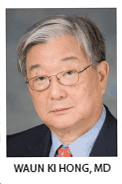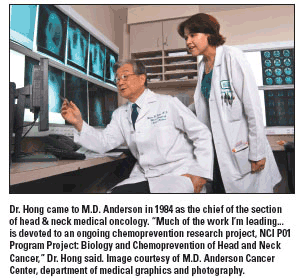Waun Ki Hong: Raising the BarHis pioneering H&N cancer trial spared the larynx; new focus is chemoprevention
Oncologists who treat head and neck cancer face a double-edged sword-life-saving procedures often leave patients disfigured or unable to speak. For Waun Ki Hong, MD, it simply wasn’t enough to offer a cure that was saddled with too many severe consequence
Oncologists who treat head and neck cancer face a double-edged sword-life-saving procedures often leave patients disfigured or unable to speak. For Waun Ki Hong, MD, it simply wasn’t enough to offer a cure that was saddled with too many severe consequences.

“My challenge in oncology is very simple-it’s raising the bar,” said Dr. Hong, speaking with Oncology News International from his office at Houston’s M.D. Anderson Cancer Center, where he is the division head for thoracic/head & neck medical oncology. Early in his career, Dr. Hong developed treatment approaches that have enabled laryngeal cancer patients to avoid radical surgery and eradicate their disease while still preserving the ability to speak and swallow. Dr. Hong took a look back at his life and career with Oncology News International.
The only oncologist
Dr. Hong was born in South Korea; a childhood interest in science steered him toward medicine. In 1960 he entered Yon Sei University of School of Medicine in Seoul. After receiving his medical degree, Dr. Hong completed an internship and did an obligatory stint in the military.
In 1970, he left his homeland for the United States. “I came to the U.S. basically looking for an opportunity in medicine, but at the time I never thought about entering the oncology field,” he explained.

In 1973, he entered a residency program at the Boston Veterans Affairs Medical Center in Massachusetts. It was among the wards filled with cancer patients that his passion for oncology was born.
“Seeing so many cancer patients who weren’t being cured inspired my desire to become an oncologist. So I took advantage of a fellowship program at Memorial Sloan-Kettering,” Dr. Hong said. While at the New York institution, several mentors, including current MSKCC physician-in-chief Robert Wittes, MD, encouraged Dr. Hong to pursue a career in academic oncology where his interest in research would be supported.
After his fellowship, Dr. Hong returned to the VA Medical Center in Boston. It was 1975, and the field of oncology was a nascent subspecialty. “When I went back to the VA, I was the only oncologist there. I was alone, except for a few staff, taking care of more than 100 cancer patients,” Dr. Hong said.
Advancing curative treatment
It was an exciting time in oncology; promising new drugs, such as cisplatin, were coming out of the pipeline. Dr. Hong spent nine challenging years at Boston’s VA, serving as chief of medical oncology.
“Something I’m proud of during my tenure at the VA was building the hospital’s oncology training program, which ended up being one of the better clinical programs in Boston. By the time I left in 1984, we had produced about 15 board-certified medical oncologists,” he said.
One highlight of the VA experience was his clinical trial work. “At that time, for people who presented with laryngeal cancer, there was once only one treatment: removal of the voice box. I felt very strongly that we could improve the outcome of this disease by enhancing the patient’s quality of life after curative treatment.”

Through the VA administration’s cooperative group, Dr. Hong conducted a randomized pilot trial of laryngeal cancer patients: one group was treated with standard laryngectomy and the other group received combination chemoradiation.
“I was one of the first to use induction chemotherapy in conjunction with radiotherapy to treat laryngeal cancer. My trial proved that survival rates were equal between the surgical and nonsurgical patients. Of course, the good news was that patients receiving combined modality chemoradiation didn’t lose their voice box. It was considered a landmark study. Now it is standard treatment,” he said.
Chemoprevention research
As his work reached a plateau in the VA system, Dr. Hong felt a calling to conduct more sophisticated research. “I was offered a great opportunity at M.D. Anderson, and in 1984 I joined the center as chief of the section of head & neck medical oncology,” he said.
Dr. Hong made translational research a top priority, pioneering research in the development of therapeutic and preventive strategies for aerodigestive cancers.
“Much of the work that I lead at M.D. Anderson with head and neck cancer is devoted to an ongoing chemoprevention research project, the NCI P01 Program Project: Biology and Chemoprevention of Head and Neck Cancer. We performed two large, randomized, comprehensive clinical trials to identify effective chemopreventive agents,” Dr. Hong explained.
The project’s goal is to develop effective chemopreventive approaches for reducing the incidence of head and neck cancer, especially in individuals who are at high risk. “Our results were interesting and promising enough to develop novel, personalized, preventive approaches to head and neck cancer,” he said.
Dr. Hong and colleagues are also engaged in another chemoprevention first, NCI study U01: Biochemoprevention Therapy in Advanced Laryngeal Dysplasia, which he calls “a very exciting project that will show whether combination chemopreventive agents using retinoids and interferon with vitamin E can induce complete phenotypic reversal.”
A sense of urgency
After 25 years of clinical work and research at the nation’s top cancer center, mentoring hundreds of oncologists, authoring and coauthoring more than 600 scientific publications, Dr. Hong says he still has a sense of urgency to help advance our ability to cure cancers.
“A big part of my job now is to inspire others in the field in our fight against cancer. But in order to make headway, we need to ask very bold questions in high-risk cancer clinical trials,” Dr. Hong said.
His pioneering work in laryngeal cancer changed the treatment paradigm. “To this day, I get emails from laryngeal cancer patients, thanking me,” he said.